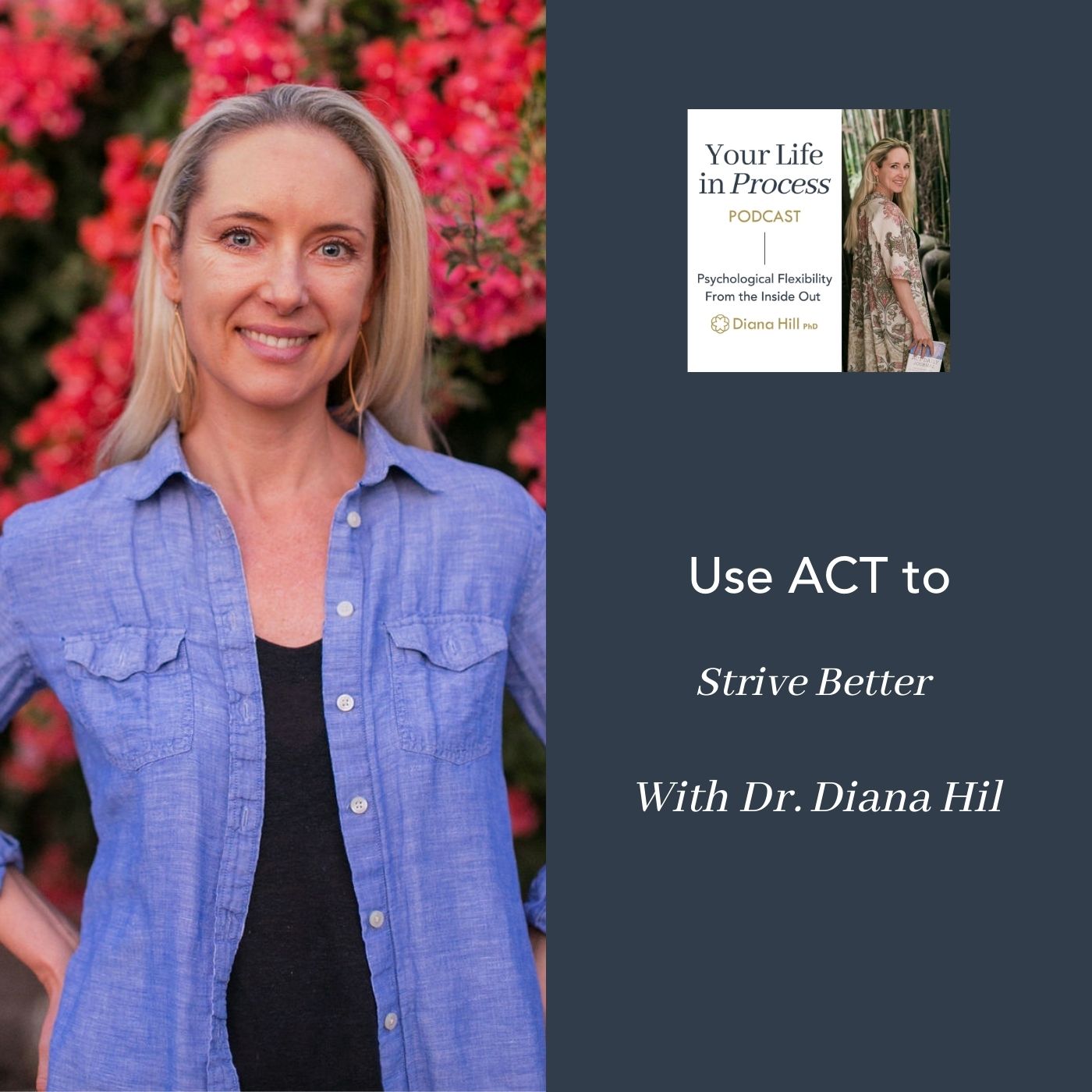How can you pursue meaningful goals without getting caught in stressful striving? How can you aim high without burning out? We all want to be successful and achieve our goals, but when our striving is driven by experiential avoidance, sometimes, our pursuits can lead to feeling dissatisfied, depleted, and burnout. In this episode, Diana shares a talk she gave to a group of high-achieving women attorneys of the Women’s Mentoring Circles Program. She explores signs of unhealthy striving and shows you how to use fierce self-compassion, values, and committed action to go from stressful striving to skillful striving. Go here for the handouts that go along with this talk.
About Diana Hill
Diana Hill, Ph.D. is a clinical psychologist, speaker, and co-author of ACT Daily Journal: Get unstuck and live fully with Acceptance and Commitment Therapy. A specialist in Acceptance and Commitment Training, Diana guides high achievers, leaders, and organizations to develop psychological flexibility so that they can take wise action toward more fulfilling and meaningful lives. Diana hosts the podcast Your Life in Process, blogs for Psychology Today, teaches on Insight Timer, is on the clinical advisory board of Lightfully Behavioral Health, and is a guest teacher at InsightLA, Blue Spirit Costa Rica, PESI, and PraxisCET. Go to drdianahill.com or her channels on Instagram, Facebook, Twitter, YouTube (@drdianahill) to learn more.
About Women’s Mentoring Circles Program
The Women’s Mentoring Circles Program is a joint program created by the Dallas Women Lawyers Association and the Dallas Association of Young Lawyers. Since its inception in 2016, the goal of the WMC Program has been to foster a community for women lawyers in Dallas who are united in the common goal to see women succeed in the legal profession. The program promotes the development, advancement, and retainment of women lawyers through mentorship, education, and community-focused programming. To learn more, visit their website.
Key Takeaways
- Striving towards goals is part of being a successful high achiever. On the flip side, these actions can become overwhelming and create stress when driven by experiential avoidance.
- Notice when striving has become unhealthy for you. Are you neglecting important parts of your life? Do you avoid certain activities or experiences?
- Skillful striving involves being present and allowing for discomfort as you flexibility move towards values
- Three processes that support skillful striving are: fierce self-compassion, values, and committed action.
Related Resources
- Download Your Daily Practice for this episode
- Find out what kind of Striver you are and get your free Skillful Striving Toolkit
- Learn More about InsightLA
- Watch Kristin Neff at the From Striving to Thriving Summit 1.0
- How self-compassionate are you? Take this test
- Check out Sonja Looney’s Podcast
- Read More about Goodhart’s Law
- Watch BJ Fogg talk about Tiny Habits
Diana’s Events
- Reserve your spot in Diana’s Reset and Restore Retreat in Costa Rica in 2023!
- Sign up for Diana’s From Striving to Thriving Summit!
- See Diana at an upcoming event
Connecting With Diana
Thank you for listening to Your Life in Process! Subscribe to the podcast for free on Apple Podcasts, Spotify, Google Podcasts. If you have any questions or feedback you can contact Diana by email podcast@yourlifeinprocess.com or leave Diana an audio message at (805) 457-2776. Follow Diana at YouTube, Instagram, LinkedIn, Facebook, and Diana’s website.
Thank you to the team Craig, Angela Stubbs, Ashley Hiatt, and Abby Diehl. Thank you to Benjamin Gould of Bell & Branch for your beautiful music.
Remember when you become psychologically flexible, you become free.
Episode Segments
- [00:00] Introduction
- [00:45] What Does It Mean To Be A Skillful Striver?
- [02:39] Sponsor: InsightLA
- [03:25] Let’s Begin Skillful Striving
- [06:37] Unhealthy Striving Checklist
- [08:11] Goodhart’s Law
- [09:02] Experiential Avoidance Roundabouts
- [13:26] Skillful Striving Checklist
- [15:04] Striving with Psychological Flexibility
- [16:57] Fierce Self-Compassion
- [20:55] Your Mind Can Be the Worst
- [23:16] Compassionate Inner Coach
- [25:24] Striving for Values
- [28:24] Committed Action for Strivers
- [33:49] Your Daily Practice
- [35:30] Connect With The Podcast

+ show Comments
- Hide Comments
add a comment